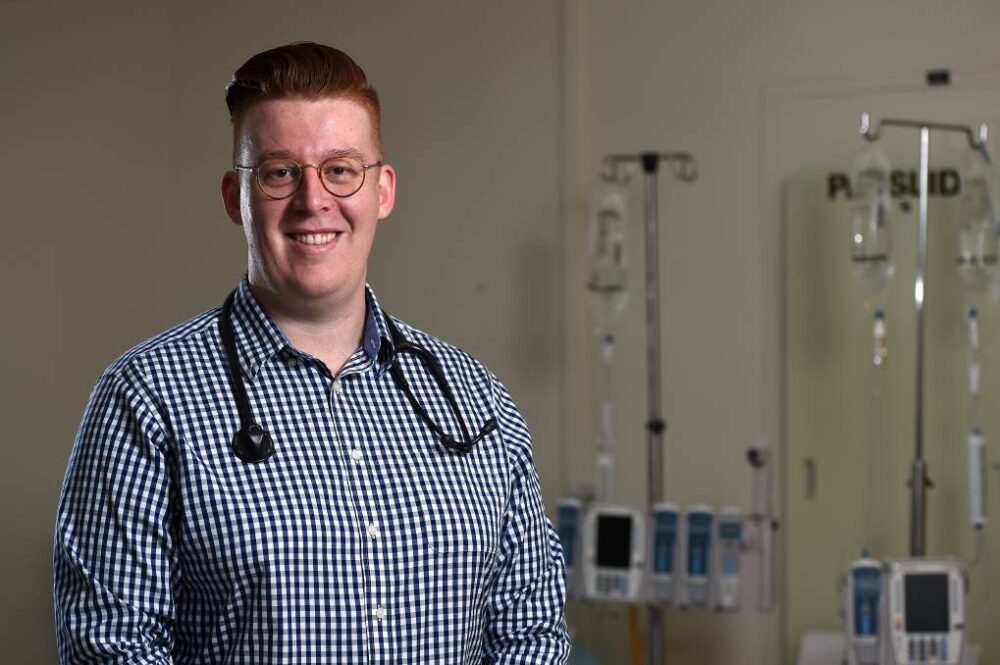Daniel Wilson was born and raised a country boy and says it was inevitable he’d end up back in the bush once he finished medical school, even if he wasn’t sure the exact role he’d play.
Daniel is currently working as a hospital registrar in the Grampians in Victoria while completing his GP training with the Australian College of Rural and Remote Medicine, but his medical career started with a Bachelor of Biomedical Science at Griffith University.
“I didn’t know exactly what I wanted to be, just that I wanted to pursue a career that would impact the lives of people and rural communities in a positive way,” he said.
“However, I did know that I wanted to be involved health care. That passion to leave an impact has taken me down the path of clinical medicine and toward a career in rural medical practice and medical leadership.
“I undertook the Bachelor of Biomedical Science (Honours) which allowed me to complete a research project as part of my degree. I specifically sought that out because I was unsure where my career would go, and the Honours program gave me a taste of academics and research while pursuing traditional science-based studies at the same time.
“That degree served as a platform to acquire critical thinking skills broadly within the medical sciences, but afforded opportunities to build graduate skills in communication, professionalism and scholarship which are all essential for my further studies and clinical work as a clinician and health leader.”
Growing up in Kempsey, a small town on the mid-north coast of New South Wales, Daniel knows first-hand the impact a general practitioner (GP) can have on their community, and says he hopes to do the same.
“A rural general practitioner is the type of specialist doctor who gets to do it all,” he says.
“They care for a family from cradle to grave, doing everything from delivering babies and treating young children, to ensuring members of their community can receive a dignified palliative care experience.
“On top of the medical side of the job, a rural GP is part of their community, and while that’s sometimes challenging as the local doctor, particularly when people come to the end of their life or you need to give medical advice to people who you consider a friend, the benefits of living, working, and enjoying life in the country outweigh any of that.”
Daniel says his time at Griffith laid the foundations for a career that would involve leadership and community service wherever possible.
“My most memorable experiences at Griffith University were interacting and networking with staff and students,” he says.
“I made connections that I still carry with me today, and I expect them to last a lifetime. Griffith has propelled my career forward in ways I could not have imaged or asked for.”
This, combined with his strong personal commitment to supporting and valuing diversity, sees him building a passion for obstetrics, LGBTIQ+ and sexual health, and medical education.
“As a junior doctor myself, I understand the importance of outstanding medical education,” he says.
“In 2019, alongside the medical education team at Ballarat Health Services, I developed a near-pear junior doctor and medical student extracurricular education program to deliver clinical education to more than 350 medical students. It was a difficult and engaging project and I’m extremely satisfied with the results.
“My other passion is improving outcomes for the LGBTIQ+ community, which is why I am now a mentor for The Pinnacle Foundation, where I volunteer as a leader, a mentor, and just be a friend as part of my mentoring relationships.
“I’ve already seen tangible results in the impact that can have on LGBTIQ+ Australians to help them realise their full potential and overcome the challenges that arise from their identity.”
Daniel says that when he started his studies, he was searching for an impactful career that would involve human factors, interaction, continual learning and the ability to effect change. Now, as a trainee rural GP and a member of several boards and committees for the improvement of rural health outcomes, he is firmly on that path. In 2019, he was named Victoria’s Junior Doctor of the Year by the Postgraduate Medical Council of Victoria.
If like Daniel you have a passion for health and education, start your career with a Bachelor of Biomedical Science from Griffith University. This degree is a great foundation for a future career in medicine or health, with a wide variety of career options available after graduation.
Several places are held in the Bachelor of Medical Science and the Doctor of Medicine for students of a rural origin through Griffith’s Rural Priority Access Scheme.



